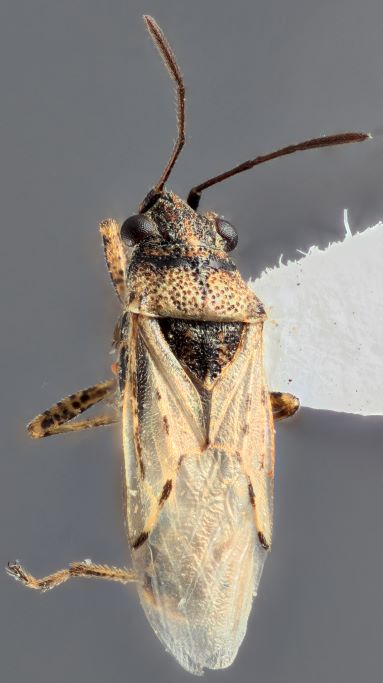False Chinch Bug (Nysius spp.)
Adult false chinch bugs move into buildings in the fall to find a place to spend the winter. Sometimes their numbers can be quite high.
Damage/Behavior:
They feed on some garden plants, Russian thistle, sagebrush, tansy mustard (and other plants in the mustard family), and kochia; they typically do little damage to these plants. They can occasionally cause damage to mustard crops. Flixweed, a common weed associated with alfalfa fields and agricultural field margins, is an important winter host for this insect. There are also several other weed hosts for this pest. They are harmless to humans and structures and are not known to bite. They become active in the spring, adults mate and lay eggs in loose soil around plants, and the eggs hatch in less than a week. They go through several nymphal (immature) stages before becoming adults (Figure 1), which is about three weeks. They can have up to three generations per year.

Fig. 1: False chinch bug adult. Photo by L. Kerzicnik
Management:
Their presence is generally temporary (about a week). Those that
enter the home typically die rather quickly. Shut down watering around the building
where they are congregating; this will force them to move to more humid areas. They
are highly resistant to insecticides and they are rarely helpful to control these
temporary invasions.
To learn more about the topics discussed on this page, contact the Schutter Diagnostic Lab. If you suspect an infestation on your property, contact your local extension agent, the Schutter Diagnostic Lab at Montana State University, or the Montana Department of Agriculture.
This November 2022 fact sheet is also available as a False Chinch Bugs (204KB).
Disclaimer: These recommendations are provided only as a guide. It is always the pesticide applicator’s responsibility, by law, to read and follow all current label directions for the specific pesticide being used. The authors and Montana State University assume no liability resulting from the use of these recommendations. The Montana State University Extension Service is an ADA/EO/AA/Veteran’s Preference Employer and Provider of Educational Outreach.
